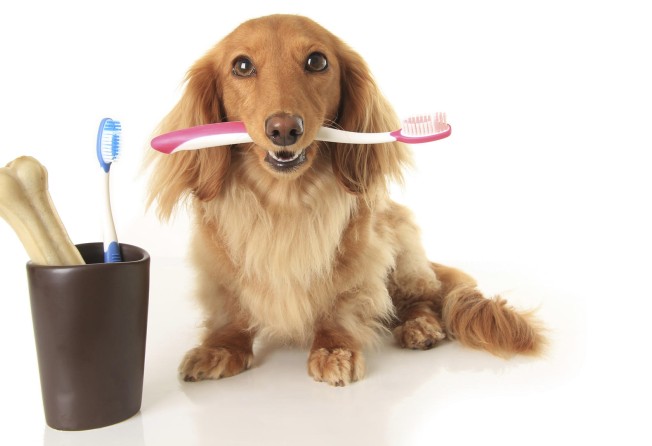
Dental hygiene for your pet
Felix Paige

Dental health care for cats and dogs is often the forgotten part of pet care, according to veterinarian David Gething, of Creature Comforts (www.creaturecomforts.com.hk).
"Most of us wouldn't dream of going through the day without brushing our teeth one or more times," he says. "But most pet owners don't brush their dog or cat's teeth at all, and those who do generally only do it once every week or two."
Gething says he understands this, with his own dogs reluctant to have their teeth brushed and the chances of his cat biting him if he tried to clean its teeth.
"This means that the average pet's dental health and dental hygiene leave much to be desired and this is a pity, because dirty teeth can have wide-ranging health consequences." However, Gething says, there are solutions that are simple and can be tolerated by cats and dogs.
Problems arise due to the mouth being a wet environment, with leftover food scraps creating ideal conditions for bacterial growth, which forms a slimy layer called plaque on the surface of the teeth. This can be removed by brushing, eating hard treats and with chew toys.
"The plaque that isn't removed causes a couple of significant problems." Firstly, bacteria in the plaque metabolises food scraps and produces acid, which damages the hard protective enamel on the surface of teeth. Over time, he says, this acid damage will lead to cavities. Secondly, the plaque will harden over time into tartar, a thick, hard, yellow-grey deposit on the teeth.
"This tartar is like a sponge, acting as a reservoir for bacteria which can result in gum inflammation and infection, as well as tooth infection and even tooth loss." Tartar is too hard to be brushed off, but can be removed by a veterinary dental cleaning. Plaque and tartar, and the related bacteria, are the cause of most cases of bad breath, in people and in pets.
High levels of plaque and tartar can present a more significant problem, as the bacteria can enter into the bloodstream.

"In serious cases, this bacteria can then cause blood poisoning and potentially infection in other organs such as the kidneys and the heart," Gething says.
Owners can help to keep teeth clean, cavity-free and healthy. "The first step is for owners to make an assessment of how good or bad their pet's teeth are. If the teeth are generally white and healthy, possibly with a small amount of light yellow or grey discolouration, and the gums are a normal pink, the dental hygiene is good, and at-home prevention and care will be the best plan." If this is not the case, veterinary treatment may be required. If in doubt, seek advice from a vet.
If you opt for brushing, Gething says to clean chewing (molar) teeth at the back of the mouth, and the biting teeth (incisors and canines) at the front, and always use a pet toothpaste. "Some human toothpastes contain xylitol, an artificial sweetener that is highly toxic to pets."
Alternatives include a dental cleaning gel, which can be applied to any area of the mouth. "The dog or cat will lick this around the mouth, and it will clean the teeth without brushing, and without harsh chemicals or bleaches."
He also recommends quality dental toys or treats to help a pet naturally clean their teeth by chewing. "I like the natural chews such as dried venison strips and kangaroo tendons. The treats are tasty and they clean the teeth while your pet enjoys chewing and playing."
There are also pet foods designed to clean a dog's teeth - the food is all-natural, and contains toothpaste impregnated in the kibble. However, Gething says, even with the best at-home care, most pets will need to have their teeth cleaned professionally.
"This involves a trip to the vet where their teeth are assessed, and then carefully scaled and polished using a special ultrasonic dental machine to remove all of the dirt, plaque and tartar. If there are any teeth that are dead or damaged beyond repair these will need to be removed, but the animal will feel immediately better, and it will not affect their eating."
He says the procedure is safe, and is the only way to repair and clean teeth with lots of tartar and damage, and should be followed up with at-home care to try to prevent the tartar and tooth decay from forming again.
For editorial inquiries: [email protected]